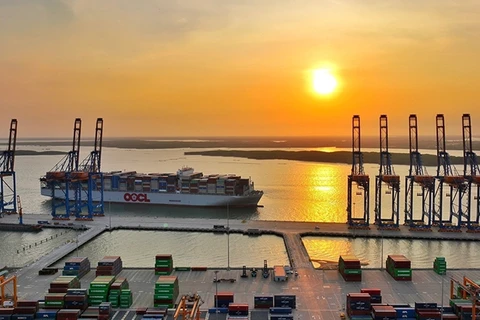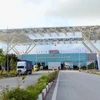Hanoi (VNA) – Vietnam’s economy is expected to grow at a solid pace this year and the next, despite a challenging global environment, said Asian Development Bank (ADB) Country Director for Vietnam Shantanu Chakraborty.
He made the remarks at the launch of the ADB’s latest Asian Development Outlook (ADO) report released on April 11.
According to the report, Vietnam’s economy is forecast to grow at 6% and 6.2% in 2024 and 2025, respectively.
At the event, Nguyen Ba Hung, ADB Chief Economist in Vietnam, said slowing global demand and high international interest rates have impacted Vietnam's growth in 2023. However, the rapid shift to pro-growth monetary policy and large-scale public investment is one of the key measures taken to sustain growth recovery.
A relatively broad-based restoration in export-led manufacturing and services and the stable performance of the agriculture sector are expected to support Vietnam’s recovery momentum. Positive inflows of foreign direct investment (FDI) and remittances, a sustained trade surplus, recoveries in domestic consumption, and continued fiscal stimulus characterised by a substantial public investment programme are seen as key to boosting growth in 2024.
 Vietnam’s economy is expected to grow at a solid pace this year and the next, despite a challenging global environment. (Photo: VietnamPlus)
Vietnam’s economy is expected to grow at a solid pace this year and the next, despite a challenging global environment. (Photo: VietnamPlus) Chakraborty said that global geopolitical uncertainties and domestic structural fragilities could impact the outlook, therefore, policy measures in 2024 will need to combine short-term growth support measures to strengthen domestic demand with long-term structural remedies to promote sustainable growth.
Softened global demand caused by a slow economic recovery and delayed normalisation of interest rates in the US and other advanced economies, coupled with continued geopolitical tensions, are likely to hamper a full recovery of Vietnam’s export-led growth in 2024, he noted.
To accelerate growth, stronger measures are required to address domestic structural fragilities, such as heavy reliance on FDI-led manufacturing exports, weak linkages between manufacturing export industries and the rest of the economy, incipient capital markets, an overreliance on bank credit, and complex regulatory barriers to business.
ADB sees public investment as a critical engine of economic growth, noting that plans must be implemented for this engine to provide power. However, the execution rate compared to planned investment has been consistently low, hovering around 80% for the year. While the Government has tried to address this problem, progress has been insufficient, it said.
Firstly, projects that have been approved with allocated budgets sometimes face delays in moving forward due to unpreparedness, according to ADB. Secondly, projects may require design or budget changes even after approval and allocation, leading to prolonged interruptions before work can commence. One significant hurdle to timely and effective project preparation is the complexity of regulations, especially concerning land use planning, acquisition, and site clearance.
Thirdly, weak coordination between public investment and budget processes has led to inadequate and slow budget allocation. Reports indicate that central agencies often receive higher allocations than they can initiate, while provinces receive insufficient funds to meet their needs. This mismatch between allocated budgets and investment mandates results in inefficiencies and delays in project implementation. Consequently, funds may not be optimally directed towards priority areas, leading to suboptimal resource utilization and hindering project progress and capital efficiency.
In 2024, public investment will remain crucial for bolstering the economy. After receiving approval from the National Assembly, the prime minister sanctioned a capital allocation plan totaling 688.5 trillion VND (about 27 trillion USD) to sustain infrastructure development and propel economic growth.
The Government has introduced several policy measures to accelerate the disbursement of public investment and improve execution efficiency. These measures encompass a range of resolutions and directives targeting various aspects of public investment disbursement.
However, to sustain progress, more systematic measures are required to improve the legal and regulatory processes for successful implementation, Chakraborty said. By proactively addressing these obstacles in an integrated manner throughout the project cycle, Vietnam can unlock the full potential of its public investment initiatives, driving sustainable economic growth and development, he added./.

























